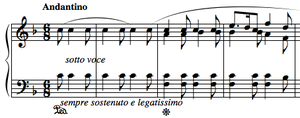Ballad No. 2 (Chopin)
The Ballade no. 2 in F major , Op. 38 is the second of four ballads of the Polish composer Frederic Chopin . Chopin composed this work between 1836 and 1839 and dedicated it to his colleague Robert Schumann of the same age .
Emergence
Like Chopin's other ballads, this work was also inspired by the “Lithuanian Ballads” of his compatriot Adam Mickiewicz . “Der Switez” is the name of the dramatic poem on which the piece of music is supposed to be based. The composer began work on his work in Nohant-Vic in 1836 and ended in 1838 after a trip to Mallorca, which he had to take for health reasons. Schumann, to whom Chopin dedicated the work out of gratitude for his dedication to the Kreisleriana , remembers that the composer played the ballad for him with an ending in F major, although the published ending is in A minor.
analysis
Twice a simply set, pastoral theme of Schumann's style and a stormy minor movement alternate in a rondo-like manner. The dramatic model by Mickiewicz is about girls from a sunken city who had been turned into water flowers in order to escape the invading Russian hordes. The fluctuating rhythm, in which the song-like, simple melody of the first part (Andantino) moves, is perfectly suited to tonally illustrate the story of the water lilies rustling in the wind . The following part, Presto con fuoco , paints very drastically the incursion of the Muscovite hordes with the help of falling clay cascades in the right hand. The recurring first part is heavily modified this time, and in contrast to the beginning, the dramatic part does not break attacca over the listener, but the tension is built up gradually in the course of the gentle part. The renewed storm of Prestos is intensified by an appended agitato section, in which the storm of feelings seems to increase immeasurably, until after a broken harp-like chord the poet speaks again in the style of the gentle section. The “Sorrow Song” of the enchanted girls ends in a few bars, but this time in A minor, the key of the stormy part, not in F major.
reception
The two Presto parts and the agitato make the ballad a virtuoso piece . The performance lasts about seven minutes. There are recordings almost exclusively with the three other ballads. The recordings by Krystian Zimerman , Evgeny Kissin and Maurizio Pollini are noteworthy .
Web links
- Ballad No. 2 (Chopin) : Sheet music and audio files in the International Music Score Library Project
